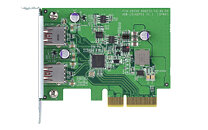- Joined
- Oct 9, 2007
- Messages
- 47,906 (7.37/day)
- Location
- Dublin, Ireland
| System Name | RBMK-1000 |
|---|---|
| Processor | AMD Ryzen 7 5700G |
| Motherboard | Gigabyte B550 AORUS Elite V2 |
| Cooling | DeepCool Gammax L240 V2 |
| Memory | 2x 16GB DDR4-3200 |
| Video Card(s) | Galax RTX 4070 Ti EX |
| Storage | Samsung 990 1TB |
| Display(s) | BenQ 1440p 60 Hz 27-inch |
| Case | Corsair Carbide 100R |
| Audio Device(s) | ASUS SupremeFX S1220A |
| Power Supply | Cooler Master MWE Gold 650W |
| Mouse | ASUS ROG Strix Impact |
| Keyboard | Gamdias Hermes E2 |
| Software | Windows 11 Pro |
QNAP Systems, Inc., a leading computing, networking and storage solution innovator, today launched the QXP-10G2U3A - a USB 3.2 Gen 2 Dual-port PCIe Expansion Card which provides speeds of up to 10 Gbps. QNAP USB 3.2 Gen 2 Expansion Cards can be installed in QNAP NAS with a PCIe slot, or Windows /Linux desktops/servers to enable faster connections to modern USB devices.
The QXP-10G2U3A includes two USB 3.2 Gen 2 Type-A ports, with each port providing up to 10 Gbps data transfer speeds. It supports the USB Attached SCSI Protocol (UASP) to facilitate fast file-sharing data transfers, uses advanced low-power processes, and follows standard PCIe/USB bus Power Management to optimize power consumption. The QXP-10G2U3A also supports overcurrent detection and short circuit protection.




"The QXP-10G2U3A expansion card enables transfer speeds up to twice as fast as USB 3.2 Gen 1 and up to 20 times faster than USB 2.0. This enhanced speed opens up new opportunities for NAS and PC users, including the ability to use a QNAP USB JBOD for easy storage expansion and high-speed data backup," said Jason Hsu, Product Manager of QNAP.
No driver is required to install the QXP-10G2U3A expansion card to connect to the TL-D800C and TL-R1200C-RP QNAP USB JBOD product series. QTS / QuTS hero NAS users can manage connected USB JBOD storage using Storage & Snapshots Manager; PC users via QNAP JBOD Manager.
The QXP-10G2U3A USB 3.2 Gen 2 Expansion Card is now available. For more information, visit the product page.
View at TechPowerUp Main Site
The QXP-10G2U3A includes two USB 3.2 Gen 2 Type-A ports, with each port providing up to 10 Gbps data transfer speeds. It supports the USB Attached SCSI Protocol (UASP) to facilitate fast file-sharing data transfers, uses advanced low-power processes, and follows standard PCIe/USB bus Power Management to optimize power consumption. The QXP-10G2U3A also supports overcurrent detection and short circuit protection.




"The QXP-10G2U3A expansion card enables transfer speeds up to twice as fast as USB 3.2 Gen 1 and up to 20 times faster than USB 2.0. This enhanced speed opens up new opportunities for NAS and PC users, including the ability to use a QNAP USB JBOD for easy storage expansion and high-speed data backup," said Jason Hsu, Product Manager of QNAP.
No driver is required to install the QXP-10G2U3A expansion card to connect to the TL-D800C and TL-R1200C-RP QNAP USB JBOD product series. QTS / QuTS hero NAS users can manage connected USB JBOD storage using Storage & Snapshots Manager; PC users via QNAP JBOD Manager.
The QXP-10G2U3A USB 3.2 Gen 2 Expansion Card is now available. For more information, visit the product page.
View at TechPowerUp Main Site



 ..
.. ..
..


